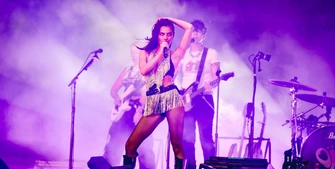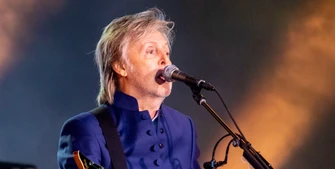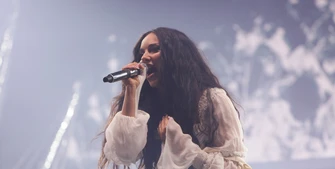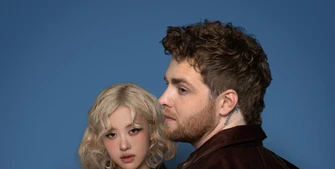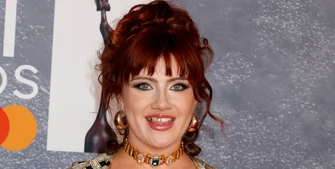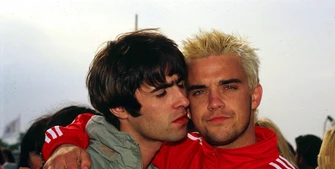Interview: Deacon Blue's Ricky Ross and Lorraine McIntosh reflect on 40 years of the band and the happiest marriage in music
Deacon Blue's Ricky Ross and Lorraine McIntosh take a trip down memory lane as they look back on 40 years of the band, as well as predict how the rise of artificial intelligence will impact them amid the release their new album 'The Great Western Road'...
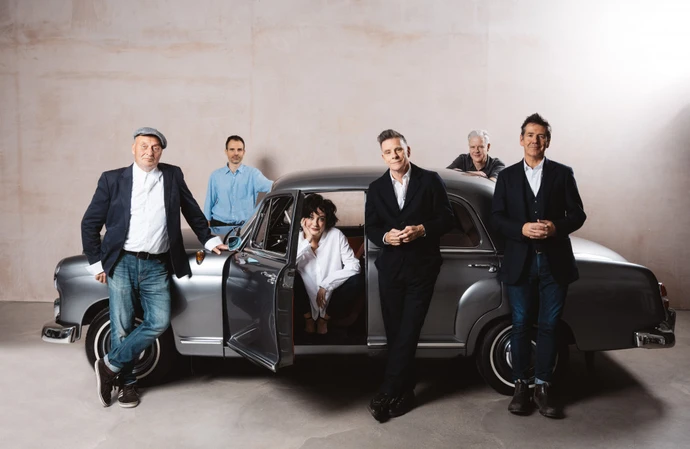
Deacon Blue is celebrating a huge milestone in 2025.
Original members Ricky Ross, Lorraine McIntosh, Dougie Vipond and James Prime, as well as newcomers Gregor Philp and Lewis Gordon, will be marking 40 years of the Scottish pop rock band in style.
Their highly anticipated 11th studio album 'The Great Western Road' is released on Friday, March 21, and the band will be hitting the road for five exclusive theatre shows in support of the LP - beginning on its launch day at Rough Trade Liverpool and ending on Friday, April 4 in London at the O2 Shepherd's Bush Empire.
A UK and Ireland tour follows - kicking off at the M+S Bank Arena in Liverpool on Friday, September 19, before returning to London on Friday, October 3 to rock OVO Arena Wembley for the first time since 1990. They will wrap up with two hometown gigs at the OVO Hydro in Glasgow on Friday, October 10 and Saturday, October 11.
Ricky and Lorraine exclusively sat down and chatted to Contact Music where they reflected on Deacon Blue's achievements over the last four decades, how they went from being friends to being one of the happiest couples in music for the last 35 years and why they fear the continuing rise of artificial intelligence...
Why do you think the band has been going strong for four decades?
Lorraine: Well, I think we've been going strong because I think at the root of it all, we have great songs, if I can say that.
And I think that's down to this man sitting here. I think we write good music, and we are a great band, and we do great live shows.
I think it comes down, at the root of it all, to the music, to the songs.
You're about to release your new studio album called 'The Great Western Road'. How do you feel about the new album?
Ricky: We are.
We've got a good feeling about it. I think we are all excited.
It takes a while to write and get an album ready, because you're just putting on the songs.
We were all going to the studio, and we were all together - in fact, we were all together right throughout it, which was great.
And I think everyone just felt a little buzz of excitement. We had a week of rehearsal, and they [the songs] were just coming together, and yes, I think we are excited. It went very well in the studio.
You don't know until you put things out there, but, we’re very excited about it.
How long did it take you both to write?
Lorraine: Well, he wrote it. And I would say it took you years, really.
Ricky: Usually it’s a couple of years.
You finish a tour, or, usually when you've finished an album, you go on tour.
And at some point, a little idea comes into your head.
And I had this thing that I wanted to do, and it was just like a little idea - I know these chords, I want to start with a song.
‘Late 88’, that was kind of really early on, and I always knew that that was an idea, and I wanted to have some songs that were going to sound quite big on the radio. But I also wanted to do songs that were true to me, true to us, about just being the age that we are, at the stage that we are in life.
And so it was probably the last two, two-and-a-half-years, or whatever.
With ‘Late 88’, you’ve got the great melodies, you've got the fantastic riffs, you've got the great harmonies. Did you think it was important to reflect on your guys' career in Deacon Blue with that song?
Ricky: It’s something that's happened before because when we put 'The Hipsters' out, it was really about us in some ways.
We were a hard-working band and things were going well for us - we had a record out, and we had a lot of gigs to do, this is like going back to 1987.
However, we hadn't had that kind of moment of just –
Lorraine: Lift off.
Ricky: Yeah, and ’Real Gone Kid’ was really that moment, and that was in 1988, and it sort of changed. I mean, you can downplay it, but it did change our lives quite a bit because it just made lots of things possible.
Apart from anything else, it was suddenly possible to do bigger gigs, to make the records.
What was the inspiration behind the lyrics on 'Late 88'?
Ricky: We were over in San Francisco, probably during the course of writing the record.
My daughter lives over in the Bay Area, and we'd always wanted to go to the de Young Museum, and someone said to us, ‘You should go and see this Alice Neel exhibition. Alice Neel was a New York artist, and the whole exhibition was called ‘People Come First’.
It was really about her determination just to paint the people that were around her in New York, lots of people who had AIDS, and just people who she encountered in street life and so on.
And I just thought it was such a strong image, strong logo that people go for, it just really got us.
Some friends said to me [when we got home], ‘You know, there's a great thing on BBC. You can watch it, about Alice Neel.'
So it was just that that really inspired it, and I just thought that's such a great title.
She was quite a trailblazer, wasn’t she?
Ricky: She was, and I think she was one of these people who were just not recognised until after she died.
Lorraine: I saw the documentary, and she wasn't recognised until she was much, much older.
It was so appropriate, just now at a time in the world where it seems like people do not come first in any political situation that we're living in.
I think there's an element of that to it as well.
You guys are going out on the road twice this year to celebrate the fantastic milestone. Are you guys enjoying performing more than you were in the ‘80s?
Ricky and Lorraine: Yes!
Lorraine: I think when you're young, you think these possibilities are going to be there forever, and when you get to our age, you realise they're not.
Life is short, grab it while you can, and it's not a job, it's a privilege to make music, it's an absolute joy.
And there are people out there spending their hard-earned cash on what we're doing.
So you know, we are much more aware of that position of privilege, I think these days.
And you also don’t have the pressure on your shoulders about trying to get number-one singles and albums anymore. You can just go and have fun playing all the hits.
Ricky: I think also - completely what Lorraine said - but, also, I think that sense of when you're younger, you’re just going, ‘What's the next thing? What's the next?'
I think we've got the wisdom now to stop and celebrate that a bit more, which is great.
And even at gigs, you just look around the room, and you think these people have come out to see us - as Lorraine said, it's hard-earned money, it’s not easy to come by, and we appreciate that more than ever.
And a whole new generation is discovering your tracks because they listened to these songs when their parents played the tracks to them when they were growing up. How do you guys feel about seeing children and teenagers attending your concerts?
Lorraine: It really has been recent - I'd say, in the last 10 or 15 years.
Suddenly we thought everyone was not our age in that audience anymore, there are people aged 22, and there are people our kids' age because, as you say, young people listen to music that their parents played them when they were growing up.
And we’ve managed to take on board quite a lot of young people, and it's wonderful.
And then they bring their kids. You've got kids on someone's shoulders. We've had grandfathers, fathers and grandchildren at the same gigs.
It’s like when we go and see Bob Dylan, and we take our kids, who didn’t grow up listening to him, but they now appreciate that he's a genius, and want to be there, you know.
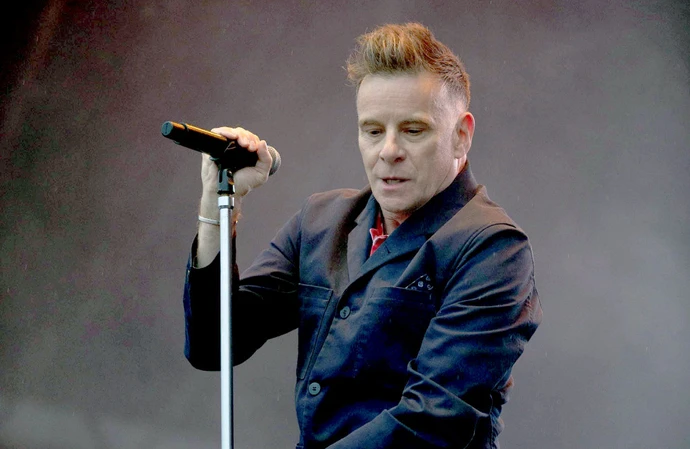
Deacon Blue performing at Blenheim Palace
Do your children think you’re cool parents?
Ricky: Our children are just the most reasonable people I know - they’re great!
And I think they should just go, ‘You know what? Just ignore it.'
They didn't grow up in the ‘80s. We did a sort of hiatus for about five or six years, so, obviously, they didn’t really grow up in that era at all.
So it was only the second time around that they managed to come to gigs.
But they're really great about it. And we will play them the new record. Obviously, I was doing lots of demos in the house, and Seamus, our youngest, was staying with us at the time, and he’d come in the room and listen, and they've been great.
They come to gigs with their friends. I don't know if they're faking it, but they’ve been really lovely about it.
You’ve had hit songs like ‘Real Gone Kid’, ‘Fergus Sings the Blues' and ‘Dignity’. When you were writing the songs, Ricky, did you have in mind that you wanted to write them in a way to make them timeless?
Ricky: You know, you can't do it.
And it's funny, because you just don't have that sense of that long road when you’re starting out.
A couple of years before, a couple of years after, it just seems like an eternity when you're in your 20s.
So, I don't think you do. I just think you want to – you do the same thing every time you write a song; I always really hope that Lorraine will like it because she’s usually the first person who hears it, and if she doesn’t like it, then it doesn’t go very far!
You've just got to hope that the first few people you play it to like it, and then maybe it goes to a radio station, maybe they play it, maybe they don't.
So, you don't really have that long sense.
Lorraine: I think you kind of have to get out what's been, kind of, come to you - do you know what I mean? You don’t really have much choice in it. From where I'm standing watching you, it's like something is given to you, this gift of a song.
Ricky: And I think you've got to be wise enough to accept it.
You know, a lot of songwriters, I think, will say that when you get an idea – I talked to Gary Barlow about songwriting and the guy’s a great songwriter, and he says when you've got it and it’s come, just don't stop, just keep going.
Don't go off and do something else, you've just got to work with it. Stay with it for half an hour, maybe an hour, and if something good comes of it, then it’ll happen.
And that’s, hopefully, what makes a good song.
Deacon Blue was formed in 1985. Lorraine, you joined in ’86/’87 as a session vocalist, originally...
Lorraine: 1987, really, yeah.
Even on ‘Raintown' [1987], I wasn't fully a part of the band.
Ricky: But you were really early on.
Lorraine: I was about then, yeah,
Ricky: You came on and did demos really early on before Jim [James Prime], so I think you were always around.
Were you a fan of Ricky’s work before you joined Deacon Blue?
Lorraine: Yes, I was. I had actually seen Deacon Blue perform in the QM [Queen Margaret] Union in Glasgow, at the university, and they were playing with Maria McKee and Lone Justice - who are brilliant.
And I saw ‘Dignity’ being performed from the audience - which is quite a unique position for someone who then went on to join the band.
And I remember thinking, I want to be in that band. I want to sing that song, and I was totally inspired by the kind of energy of Ricky as a lead singer and as a frontman. He just had this heat-seeking missile kind of directness about him, which I think you still have.
Ricky, before you became a musician, you were an English teacher in a secondary school. How come you taught English and not music?
Lorraine: Because you’re a wordsmith!
Ricky: I wasn't technically good enough to be a musician, certainly, but I don't know.
I ended up teaching English because - I think I would've probably rather taught history, but everyone said to me there are no jobs as a history teacher, so I ended up being an English teacher.
And it's lovely, actually, because in the last two weeks, I've had a pupil that came up to me and said, ‘Actually, you taught me.’
And other people have got in touch via our management, saying, ‘You taught me,' and I remember them very well.
It was a lovely experience for me. I only taught for two-and-a-half years, but I've got some really great friends who were colleagues, but also friends who were pupils, and it was a magical time.
Lorraine: We meet a lot of people in Glasgow who Ricky taught, but one of them is just retiring - and he was your pupil! We were like how could that be possible?!
Do you go back to the school to talk to the students about music?
Ricky: No because it closed down not long after I’d left!
I did go back once we'd sort of broken through and stuff like that, which was lovely, the people were great at the school.
The school was in Mary Hill. My journey to work involved getting off a tube - the underground in Glasgow - on Great Western Road, oddly enough, right at the start of Great Western Road, and walking up to where the school was in Mary Hill. And so that's why Great Western Road is such a big part of our lives.
Your Scottish roots are reflected in the songs, aren't they?
Lorraine: Certainly Glasgow at that time was a real hotbed.
I mean, the number of bands is just incredible that came out, and who were successful; everyone from Simple Minds, The Blue Nile, Love and Money, Hue and Cry, Wet Wet Wet, us, Texas, all in a very short period of time.
It was something in the water at that point, and I think everyone is created and formed by where they're from.
Were you ever told you may be held back when to get into music because of your Scottish accents?
Ricky: To be honest, if anyone tries to tell you it was a disadvantage, it's not true.
Lorraine: Not in the music business - I think in TV it was.
Ricky: Yeah, maybe in TV, but, certainly in music, it was an advantage. And I think you had a story to tell - we were really inspired, also.
I knew about Simple Minds, and how massive they were. And one of the big stories of Simple Minds was that they just didn't leave Glasgow. You know, they didn’t - they expected people to come to them, they didn’t go down to London and say, ‘Here we are.’
So I think that was a huge inspiration for - well, certainly for me. And we always said, 'Right, we're doing a gig, and you guys have got to come up and see us.’ And they did, which was great.
Lorraine: Thank goodness.
‘When the World Knows Your Name’ came out, it got to number one. Can you remember where you were when you found out that the album was number one?
Ricky: We were terrible for actually going, ‘OK, that's fine. What's next?’
And we were having fun, the Fergus [Sings the Blues] - I was having a fight with the record company about the Fergus [music] video.
Honestly, I was a mess. And that's partly why I wanted to go back and kind of re-address it because we all felt we didn't probably celebrate these things as we should have.
So, I don’t remember where I was.
Lorraine: We were all set to celebrate our last album, ‘City of Love’ [in 2020] - it came in at number four, and we were absolutely delighted.
And then the lockdown happened about four days later!
So, all the plans for that album all fell by the wayside.
So, however this album does, we will celebrate it.
Ricky: Yeah.
How will you celebrate this album?
Lorraine: For ‘City of Love’, we just had the guys round and their wives came, and we had a - they now call it the ‘Super-Spreader Event’, but we didn’t know it at the time!
But we sat and we had a meal; we had a curry, we had drinks, and we played the album really loudly, and we all got COVID - so that won’t be happening this time!
Ricky: What we tend to do is get out on the road when we’re out on the road on the bus. Dougie hosts a party, post-gig sometimes, which is very good.
Lorraine: On the tour bus.
Ricky: Dougie with his bar is a big, sort of, feature.
So, yes, that’s when it’ll happen.
With your success in the ‘80s, you had a massive fan base. Can you remember some of the craziest fan interactions that you had?
Ricky: It was really mostly positive, to be honest with you. It was mostly positive. There were a few - there was this one particular time when someone was kind of getting a little bit too stalky, but we got a pretty easy ride.
Lorraine: That was one person out of thousands. And the amazing thing is we've made friends with some of these fans who have been coming to our gigs for years, and we see them every tour.
Ricky: One of my best friends I just saw for dinner recently was a guy called Jimmy; I should mention Jimmy Rice he's a great friend, and he bought tickets for all his pals to come see us supporting Ben E. King in Manchester, we were supporting Ben E. King.
Lorraine: 1980 what?
Ricky: 1987.
And then he and his friends would start coming to like tiny gigs - there was no one there; it was, maybe, 20 people there at Huddersfield Polytechnic or something like that.
And he and his pals would come, and they were the ones that all started singing back, like, ‘Loaded'.
‘Loaded’ was the first - it wasn’t ‘Dignity’ - it was ‘Loaded’, and we just became friends.
We just became really good friends. So, we're grateful for that, and we've got friends across the world as well that we've met, which has been lovely.
Did you guys receive any strange fan mail?
Lorraine: I really don’t know if you want to hear this but someone sent their pubic hair!
Ricky: No! I don’t remember that. No!
Lorraine: I do. Yeah. Photographs of her with her hamsters, and then a piece of her pubic hair.
Oh, that was a long time ago.
Ricky: I must’ve erased that one!
Lorraine: There are some unhinged people out there.
Now, they would just go online and say something, but in those days, they would write, and they would send photographs of themselves - and up to all sorts of things!
Ricky: I must say, to this day, we’re artists, and we’ll always find the one comment on social media.
But, people are really good, they’re really kind.
Going back to your songs and the opportunities that you received with Deacon Blue, were there any opportunities that you regret turning down?
Ricky: There were things that you got invited to do; there are things like the John Lennon [Tribute Concert] we played in Liverpool [in 1990], and things like that.
And there have been events. I think we always preferred just being ourselves. For example, we didn’t do big support tours with other artists. We did one-offs, like I mentioned, Ben E. King.
We did these one-off shows over the course of, maybe, the early days, but we weren't given to going off and doing big support tours.
And festivals - we’ve never been big festival lovers. We, kind of, like our own room.
Lorraine: Be in control of your own room.
Ricky: Our own theatre, our own place.
Lorraine: But, we do charity gigs!
Ricky: Yeah, we always do charity gigs.
Lorraine: We haven’t actually been asked to do a charity gig. We did one years ago that you organised for Oscar Marzaroli.
But, mainly, it’s gigs.
We did a gig this year to raise money for medical aid for Gaza, we did that at the Glasgow Concert Hall, and we've always been involved in charity gigs, really.
It’s fantastic to give back, isn't it?
Lorraine: Exactly!
We do our own things charity-wise; we've chosen two charities to be involved in up here - one is SCIAF, which is an international charity to give aid, and we do the Signing Community, which is for homeless people in Glasgow, and we try and focus on these two and get closely involved.
But other things come along. We're about to do something at the Maggie's [Cancer Care] Centre for the Hospice.
You know, it's just you don't want to say no to these things.
Ricky: Everyone thinks a gig will be the answer to all their sort of fundraising things, but you just can't do them all.
Lorraine: No, you can’t do them all.
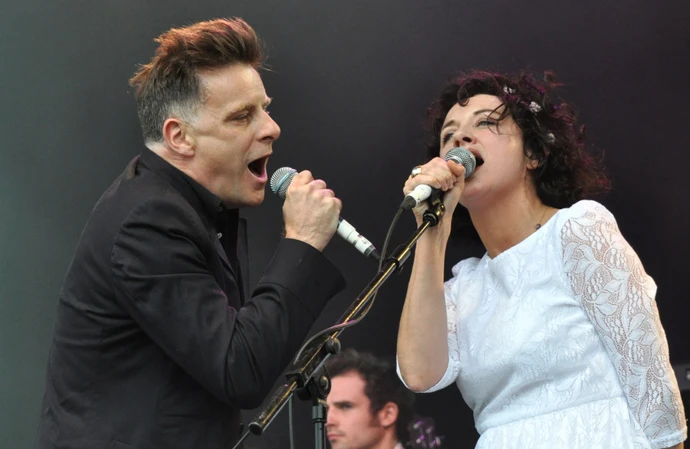
Ricky and Lorraine performing at Cornbury Festival
You guys got married in 1990. When did you two know that you were both meant for each other? Was it love at first sight?
Ricky: No. We knew each other over a period of time.
I always think I knew her brother before I knew her - we were part of a group of friends that knew each other, to be honest with you.
And in fact, Lorraine’s brother, John - in the early days before Deacon Blue, I had a pickup band, and various people played - would come up and sing with me, and so when we still go to family parties at Christmas, it’s Lorraine and John who always sing together.
So, yeah, we were friends, and then we became more than friends, obviously, but it's been a long time.
Lorraine: It’s been 35 years this year.
Ricky, what was it about Lorraine that you fell in love with?
Ricky: Ah, there you go!
Lorraine: That’s a big question - for another time!
Ricky: Well, I’ll tell you.
It’s still the same thing - she was someone who inspired me and still inspires me, I just love the way she thinks about things, she makes me laugh all the time - but she's also gorgeous!
How about you, Lorraine, what did you fall in love with about Ricky?
Lorraine: It’s hard to put into words what you fall in love with about someone, but I just think he's a great person. I think he's fascinating, he's talented, he's driven.
Ricky: That’s enough!
Lorraine: We’re very, very different from each other - let’s just put it like that.
Ricky: Yeah, we’re very different - but we’re very close.
Lorraine: Yeah, very different - but it seems to work.
As you mentioned, you’ve been married for 35 years now. What would you say is the success of a long and happy marriage?
Lorraine: I think a lot of it's luck, to be honest.
I think if you find the right person, then it's going to work, and if you don't find the right person, it's not going to work.
And, you know, we've had a great life, but life can be hard for a lot of people.
That can make relationships a lot harder. You know, when poverty comes in through the window, love goes out the door; life can be hard for people.
We've had a lot of good things happen to us in life, but I do think that a certain element of it is luck in the right person.
Ricky: Yeah, and you just kind of know, and you have friends who have been married for a long, long time, and they’re great company and so on. And other friends that you think the relationships didn't work out.
So, we're very grateful.
Lorraine, we always hear your incredible vocals with Ricky, as well as see your brilliant dancing with the tambourine. Have you ever considered doing something like 'Strictly Come Dancing'?
Lorraine: I've never been asked!
And I have to say if I was, it would be the only one I would consider because dancing is actually something I absolutely love.
Last night, he was out doing a radio show, and I was in here in my living room dancing to Self Esteem.
I played the new single at top volume, and I just love dancing and singing at the same time - so come and see us do it again!
Ricky: She loves it as much as I hate it!
The UK Government wants to legalise copyright for AI companies to take the creative work of audio, music and TV for their AI modules. Could it have an impact on Deacon Blue, such as potentially stopping the band?
Ricky: The 'Silent Album' that came out and so on, I think that was a really good thing.
Musicians have got to wake up and fight back.
When I started in songwriting and publishing, it was common then for publishers to have 50 per cent of royalties. We all fought back against these things.
Things don't happen by osmosis, you know.
So it's important for musicians to take charge of their career and for the music industry to look and see what the future is, and make sure that you're protecting songwriters. So, yes, it’s really important stuff, and I’m grateful for people who are taking up the fight.
If it gets legalised, could it, perhaps, result in the end of bands like Deacon Blue?
Well, I think it’s a scary time across all these things, and it’s such a new world that no one really quite knows.
I mean, there are some great things about AI, don’t get me wrong. I’m very excited about what’s going to happen in terms of medical stuff and so on.
But, I think we’ve got to wake up and be quite strong.
Lorraine: It has to be regulated doesn't it? It can’t just be unleashed, which it seems to be being.
Ricky: And to be honest with you, also, it’s been so difficult.
The last 25 years have been a complete scene change in how music has been consumed.
People have lost so much of their potential income from record sales, and I think the music industry has done really well to claw some of that back.
But, yeah, we’ve got to be very careful.
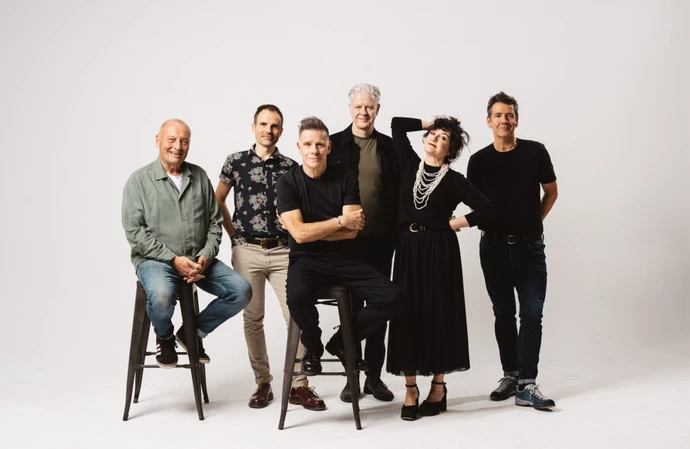
Current line-up of Deacon Blue
Deacon Blue release 'The Great Western Road' on Friday, March 21 2025.
Deacon Blue 2025 tour dates:
Theatre:
Sunday, March 30 - Edinburgh Usher Hall
Monday, March 31 - Bradford St George’s Hall
Wednesday, April 2 - Bristol Beacon Theatre
Thursday, April 3 - Cambridge Corn Exchange
Friday, April 4 - London Shepherd’s Bush Empire
Arena:
Friday, September 19 - Liverpool M+S Bank Arena
Saturday, September 20 - Brighton Centre
Monday, September 22 - Birmingham Utilita Arena
Tuesday, September 23 - Leeds FirstDirect Arena
Thursday, September 25 - Bournemouth International Centre
Friday, September 26 - Cardiff Utilita Arena
Sunday, September 28 - Nottingham Motorpoint Arena
Monday, September 29 - Sheffield Utilita Arena
Wednesday, October 1 - Manchester AO Arena
Friday, October 3 - London Wembley OVO Arena
Sunday, October 5 - Hull Connexin Live
Monday, October 6 - Newcastle-Upon-Tyne Utilita Arena
Wednesday, October 8 - Dublin 3Arena
Friday, October 10 - Glasgow Hydro
Saturday, October 11 - Glasgow Hydro

